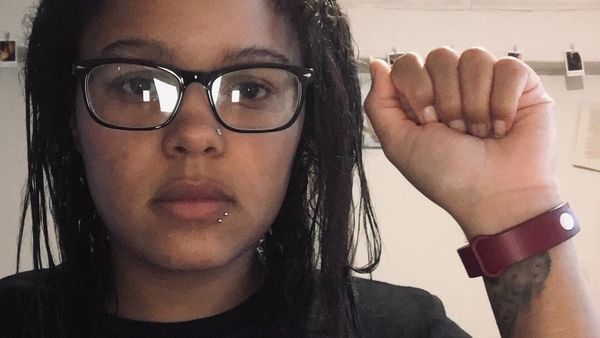I remember Dr. Martin Luther King's birthday being incredibly celebrated on the Southside of Chicago where the majority of people are Black. To me, Dr. Martin Luther King Day really didn't have much to do with Dr. King. To me, my family and my community it celebrated all of the lives lost in the Civil Rights Movement. Dr. Martin Luther King Day is the celebration of Black Pride, but my first Dr. Martin Luther King Day on St. Olaf's campus was pretty non-existent. Most people didn't know. I forgot until my mom texted me, "Happy MLK Day!" Yeah, it's a big enough holiday for my mom to text it to me. She wanted to know what I was doing to celebrate. I was incredibly ashamed to tell her that nothing was planned. That nothing was happening. That there would be no memorial. That there would be no vigil. There were no signs. There were no events. There was absolutely nothing. Didn't people celebrate this holiday? From the deadness on campus, the only answer could be no. I had lunch with other Black and African American students that day. I brought it up. We all felt frustrated about it. Why was nothing happening?
Needless to say, after lunch I headed what was then called the MCA office and now called the CMIE office. Thankfully, I wasn't the only one to notice how wrong that Civil Rights Activists' efforts were completely ignored on this college campus which now has a memorial for a late St. Olaf reverend who died for marching with Dr. Martin Luther King in Selma. Luckily, others took our feelings of uneasiness about the lack of celebration and decided to make it more known the upcoming years. It was really too late, though. It stung.
It didn't sting because people just ignored Dr. Martin Luther King Day. It stung because in that moment I realized that the majority of White America would rather forget that time in American History. It stung because I couldn't help but feel joy from knowing that my grandmothers who were there during the Civil Rights Movement were also able to watch the first Black President take office. It stung because that was the movement that made it possible for me to be here at St. Olaf. It stung because I realized that my celebration wasn't theirs.
I remember going back to my small Kildahl room and listening to Strange Fruit by Billie Holiday and remember feeling strength that I came from people who endured being that Strange Fruit. I listened to it as I read Nikki Giovanni's Ego-Tripping. I thought about the Freedom Riders who were my age and had the courage to change their world and mine. I thought back to elementary school where we spent a month and a half learning about important Black leaders and the movement while I ate free lunches and breakfasts that Black Panthers fought and defended.
I also looked back on all the racism I still had to fight through. The fact that people still yelled "Go home, niggers!" at my family and drove off in their confederate flagged trucks signaled just how much our post-racial our society really was. I was spat on at school for being Black. A Black teacher once told my all-White kindergarten class that she would try to rub the black off her skin when she took a bath as a child. After that day, they all regarded me as dirty. I remember my hair being pulled for being too nappy. I still had to deal with being kicked out of stores. I still experienced trying to men trying to buy me because they think every Black female has a price. Despite looking at all of that, I was still happy about this day. It was still pride that I felt for overcoming past, present and future racial discrimination. I felt pride that my family overcame worse and still laugh and smile.
I had to recognize that the majority of St. Olaf students can't or don't want to relate to that pride and that reflection. MLK Day was more like FUBU (For Us By Us) Day for Black and African American students on campus, and it should not have been. It should have been a day for everyone to reflect on how much had changed and how much had stayed the same. I'm asking you to do that now. Can you look out at our campus, your neighborhood, your city, your state, your country and completely say that we have reached the equality that the Civil Rights Movement fought for?





















